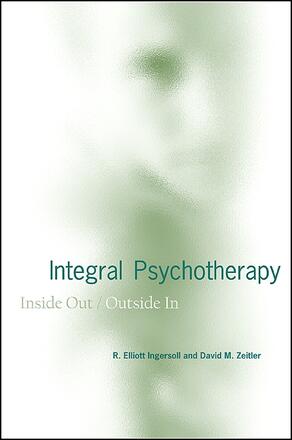
Integral Psychotherapy
Inside Out/Outside In
Alternative formats available from:
Introduces integral psychotherapy to scholars, practicing psychotherapists, and general readers.
Description
In Integral Psychotherapy, self-help meets rigorous scholarship. Integral Psychotherapy is a dynamic framework for understanding the mind and uniting spirituality and psychotherapy. Authors Elliott Ingersoll and David M. Zeitler use Ken Wilber's Integral Model to guide readers through a startling new view of psychotherapy as a spiritual journey of self-discovery. This is the first book that grounds the Integral approach in mainstream research while showing how Integral Psychotherapy treats body, mind, and spirit, and it offers an accurate history of many psychological ideas (some mistaken) prevalent in our society. Integral Psychotherapy debunks the fads and fashions of self-help gurus while mapping terrain readers can use to bring their lives into focus. With humor and compassion the authors show that the life of the mind is complex and complexity is our friend.
R. Elliott Ingersoll is Professor of Counseling and Counseling Psychology at Cleveland State University. His books include Psychopharmacology for Helping Professionals: An Integral Exploration; The Mental Health Desk Reference: A Practice-Based Guide to Diagnosis, Treatment, and Professional Ethics; Becoming a 21st Century Agency Counselor: Personal and Professional Explorations; and Explorations in Counseling and Spirituality: Philosophical, Practical, and Personal Reflections. David M. Zeitler is Assistant Professor at John F. Kennedy University where he teaches in the Integral Theory Program and Integral Psychology Program.
Reviews
"…A Guide to Integral Psychotherapy … [and] Integral Psychotherapy … are a magnificent bridge between clinical practice, current academic psychology, and the expansive, liberating world of integral epistemology … [they] do not shy away from the difficult task of introducing Integral Theory in general, Integral Psychology in particular, and Integral Psychotherapy as a primary focus. They lead the reader through progressively deeper levels of understanding and possibilities, sourcing their points in Wilber's work and current/past psychological perspectives. " — Journal of Integral Theory and Practice
"There is much to like about the text. The authors write with conviction, clarity, and humor. The book as a whole, as well as each of the individual chapters, features an upfront summary of the content that follows … The authors also stay true to the heart of integral theory and write this ambitious work with consistent attention to inclusivism, which embraces topics of spiritual development and transformation. " — PsycCRITIQUES
"…a wonderful addition to the integral field … I hope that we will see more books from these authors, both of whom are the next generation of integral leaders. " — William Harryman, Integral Options Café
"This is the most comprehensive book on Integral Psychotherapy to date. Wonderfully balanced between critical thinking and practical instruction, and interspersed with good doses of humor, it simultaneously serves as both an introduction to those new to this complex yet parsimonious system while also critically delving into its many intricacies for those who are already familiar with Integral Theory. Highly recommended. " — Andre Marquis, author of The Integral Intake: A Guide to Comprehensive Idiographic Assessment in Integral Psychotherapy